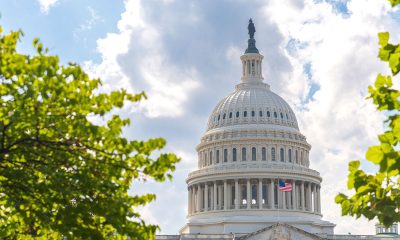Activism
Four Community Pillars Support Rise East Project in Oakland
“Seeing the disparities in our area, our approach — to be on the ground — best served this population,” said Dr. Noha Aboeleta, the founder of Roots says. “ROOTS is a community-based response organization. Over the years we grew from two people to 200 full-time staff.”

Part 4
By Tanya Dennis
Roots are deep in Deep East Oakland.
The Roots Community Health Center was founded in 1998 in Deep East Oakland at 99th and International Blvd. with a mission is to uplift those impacted by systemic inequities and poverty.
Roots accomplishes this through medical and behavioral health care, health navigation, workforce enterprises, housing, outreach, and advocacy.
“Seeing the disparities in our area, our approach — to be on the ground — best served this population,” said Dr. Noha Aboeleta, the founder of Roots says. “ROOTS is a community-based response organization. Over the years we grew from two people to 200 full-time staff.”
Unable to do all the interventions that were needed on their own, and recognizing the value of collaboration, Roots leadership brought together what would become the ‘40 by 40’ Council “to preserve what we have and as a resource to continue to build,” Aboeleta said.
Under Aboeleta’s leadership, the 40 by 40 Council consists of the Black Cultural Zone (BCZ), the Brotherhood of Elders, and the East Oakland Youth Development Center (EOYDC). The four stakeholders and community builders agreed it was time to take their direct services and advocacy to the neighborhood level. Together, they identified a 40-block by 40-block area in Deep East Oakland for development, preservation, and restoration.
Explaining what she terms her intentional selection of organizations for the Council, Aboeleta says, “We partnered with Black Cultural Zone as they work with a coalition of residents, government agencies, churches and grassroots organizing and community groups to help keep Black folks in East Oakland through building power, securing land and directing more dollars to community driven projects.
BCZ provides space at Liberation Park where people can gather and convene, Aboeleta said. In addition, BCZ has a development corporation, and we recognized the need to develop commercial and residential space for us to address those that have been displaced. To assure that they would have the first ‘right of return,’ a development corporation would be vital.”
Next, Aboeleta reached out to the Brotherhood of Elders because they have such an important place in the community: “bringing history wisdom and relationship with a focus on Black men and boys,” Aboeleta said.
Aboeleta regards the fourth stakeholder, EOYDC, as the anchor of the Council.
EOYDC, developed with aid from the Clorox Corporation, has operated since 1978 in Deep East Oakland and has focused on youth development, providing social services to youth for three decades
EOYDC develops the social leadership capacities of youth and young adults ages 5-24 so youth achieve excellence in education, career and service to their community.
According to Aboeleta, “BCZ and the Brotherhood bring together other organizations; are assisting in developing a community land trust; and developing other components important to this work.
“Rise East is really an amazing opportunity none of us imagined,”Aboeleta said.
In April 2023, Blue Meridian Partners Philanthropy wanted to see the 40 by 40 area, so the council took them to Liberation Park at 73rd Avenue and Foothill Boulevard and the surrounding area. They saw the vision and were impressed.
“It’s still a work in progress,” Aboeleta said. Before Blue Meridian, the Council was raising small amounts of funding from community-based grants, using those grants to align what each organization was doing.
“Blue Meridian was not something we expected but now we can accelerate this work because of the urgency of displacement, violence and health disparities occurring in our community,” Aboeleta said.
Rise East funding is for five years but the plan is for 10 years.
Besides Blue Meridian, Rise East is working with Oakland Thrives, a key partner engaging key leaders from the Alameda County, the City of Oakland and the Oakland Unified School District Board of Trustees.
“They are at the table, which provides an opportunity for us to align private funding with public funding,” Aboeleta said. “We must be asset-based and because of these amazing partnerships in the public sector, we can partner around policy and how things can be implemented at the city, county and state level. That’s our next step. Public funding for Rise East.”
For a comprehensive overview of Rise East go to:
Activism
OP-ED: AB 1349 Puts Corporate Power Over Community
Since Ticketmaster and Live Nation merged in 2010, ticket prices have jumped more than 150 percent. Activities that once fit a family’s budget now take significant disposable income that most working families simply don’t have. The problem is compounded by a system that has tilted access toward the wealthy and white-collar workers. If you have a fancy credit card, you get “presale access,” and if you work in an office instead of a warehouse, you might be able to wait in an online queue to buy a ticket. Access now means privilege.

By Bishop Joseph Simmons, Senior Pastor, Greater St. Paul Baptist Church, Oakland
As a pastor, I believe in the power that a sense of community can have on improving people’s lives. Live events are one of the few places where people from different backgrounds and ages can share the same space and experience – where construction workers sit next to lawyers at a concert, and teenagers enjoy a basketball game with their grandparents. Yet, over the past decade, I’ve witnessed these experiences – the concerts, games, and cultural events where we gather – become increasingly unaffordable, and it is a shame.
These moments of connection matter as they form part of the fabric that holds communities together. But that fabric is fraying because of Ticketmaster/Live Nation’s unchecked control over access to live events. Unfortunately, AB 1349 would only further entrench their corporate power over our spaces.
Since Ticketmaster and Live Nation merged in 2010, ticket prices have jumped more than 150 percent. Activities that once fit a family’s budget now take significant disposable income that most working families simply don’t have. The problem is compounded by a system that has tilted access toward the wealthy and white-collar workers. If you have a fancy credit card, you get “presale access,” and if you work in an office instead of a warehouse, you might be able to wait in an online queue to buy a ticket. Access now means privilege.
Power over live events is concentrated in a single corporate entity, and this regime operates without transparency or accountability – much like a dictator. Ticketmaster controls 80 percent of first-sale tickets and nearly a third of resale tickets, but they still want more. More power, more control for Ticketmaster means higher prices and less access for consumers. It’s the agenda they are pushing nationally, with the help of former Trump political operatives, who are quietly trying to undo the antitrust lawsuit launched against Ticketmaster/Live Nation under President Biden’s DOJ.
That’s why I’m deeply concerned about AB 1349 in its current form. Rather than reining in Ticketmaster’s power, the bill risks strengthening it, aligning with Trump. AB 1349 gives Ticketmaster the ability to control a consumer’s ticket forever by granting Ticketmaster’s regime new powers in state law to prevent consumers from reselling or giving away their tickets. It also creates new pathways for Ticketmaster to discriminate and retaliate against consumers who choose to shop around for the best service and fees on resale platforms that aren’t yet controlled by Ticketmaster. These provisions are anti-consumer and anti-democratic.
California has an opportunity to stand with consumers, to demand transparency, and to restore genuine competition in this industry. But that requires legislation developed with input from the community and faith leaders, not proposals backed by the very company causing the harm.
Will our laws reflect fairness, inclusion, and accountability? Or will we let corporate interests tighten their grip on spaces that should belong to everyone? I, for one, support the former and encourage the California Legislature to reject AB 1349 outright or amend it to remove any provisions that expand Ticketmaster’s control. I also urge community members to contact their representatives and advocate for accessible, inclusive live events for all Californians. Let’s work together to ensure these gathering spaces remain open and welcoming to everyone, regardless of income or background.
Activism
Oakland Post: Week of December 31, 2025 – January 6, 2026
The printed Weekly Edition of the Oakland Post: Week of – December 31, 2025 – January 6, 2026

To enlarge your view of this issue, use the slider, magnifying glass icon or full page icon in the lower right corner of the browser window.
Activism
Big God Ministry Gives Away Toys in Marin City
Pastor Hall also gave a message of encouragement to the crowd, thanking Jesus for the “best year of their lives.” He asked each of the children what they wanted to be when they grow up.

By Godfrey Lee
Big God Ministries, pastored by David Hall, gave toys to the children in Marin City on Monday, Dec. 15, on the lawn near the corner of Drake Avenue and Donahue Street.
Pastor Hall also gave a message of encouragement to the crowd, thanking Jesus for the “best year of their lives.” He asked each of the children what they wanted to be when they grew up.
Around 75 parents and children were there to receive the presents, which consisted mainly of Gideon Bibles, Cat in the Hat pillows, Barbie dolls, Tonka trucks, and Lego building sets.
A half dozen volunteers from the Big God Ministry, including Donnie Roary, helped to set up the tables for the toy giveaway. The worship music was sung by Ruby Friedman, Keri Carpenter, and Jake Monaghan, who also played the accordion.
Big God Ministries meets on Sundays at 10 a.m. at the Mill Valley Community Center, 180 Camino Alto, Mill Valley, CA Their phone number is (415) 797-2567.
-

 Activism4 weeks ago
Activism4 weeks agoDesmond Gumbs — Visionary Founder, Mentor, and Builder of Opportunity
-

 Activism4 weeks ago
Activism4 weeks agoFamilies Across the U.S. Are Facing an ‘Affordability Crisis,’ Says United Way Bay Area
-

 Alameda County4 weeks ago
Alameda County4 weeks agoOakland Council Expands Citywide Security Cameras Despite Major Opposition
-

 Alameda County4 weeks ago
Alameda County4 weeks agoBling It On: Holiday Lights Brighten Dark Nights All Around the Bay
-

 Activism4 weeks ago
Activism4 weeks agoBlack Arts Movement Business District Named New Cultural District in California
-

 Activism4 weeks ago
Activism4 weeks agoLu Lu’s House is Not Just Toying Around with the Community
-

 Activism4 weeks ago
Activism4 weeks agoOakland Post: Week of December 17 – 23, 2025
-

 Black History3 weeks ago
Black History3 weeks agoAlfred Cralle: Inventor of the Ice Cream Scoop





















































